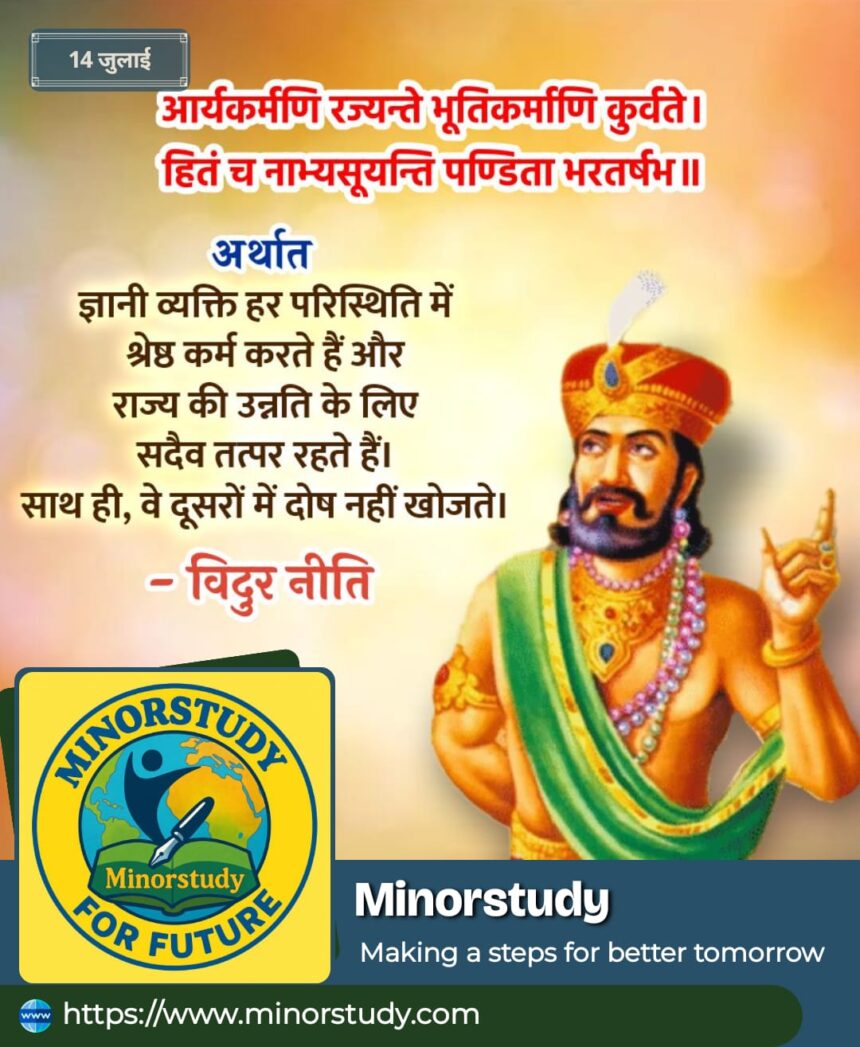7 Timeless Life Lessons from Vidur Niti That Every Wise Person Should Follow – A Powerful Legacy of Righteousness
“Aryakarmani Rajyante Bhutikarmani Kurvate. Hitam cha nabhyasuyanti pandita bharatarshabha.”
(Vidur Niti)
- 🏛️ Introduction: The Eternal Wisdom of Vidur Niti
- 📜 History of Vidur Niti
- 📌 7 Fascinating Facts About Vidur Niti
- 🗓️ Timeline of Vidur Niti’s Influence
- 🎯 Significance of the Quoted Verse
- 💡 Key Teachings from Vidur Niti for Modern Life
- 1. Truth Above All
- 2. Self-Control is Power
- 3. Avoidance of Jealousy
- 4. Leadership Through Dharma
- 5. Detachment from Results
- 6. Choose Company Wisely
- 7. Serve Society, Not Just Yourself
- 🙏 Observance and Relevance in Today’s World
- 🎉 Wishing on the Teachings of Vidur Niti
- 🔍 Frequently Asked Questions (FAQs)
- Q1: Who was Vidura?
- Q2: What is Vidur Niti?
- Q3: Is Vidur Niti still relevant today?
- Q4: What is the meaning of the verse “Aryakarmani Rajyante…”?
- Q5: What type of literature is Vidur Niti?
- 🧭 Importance in Our Life and Society
- 🪔 Conclusion: The Eternal Light of Vidur Niti
Translation:
The wise always engage in righteous acts for the prosperity of the state and never criticize the good done by others.
🏛️ Introduction: The Eternal Wisdom of Vidur Niti
In the vast ocean of Indian philosophy and political ethics, Vidur Niti shines like a guiding star. A part of the great Indian epic Mahabharata, Vidur Niti consists of the powerful discourses given by Vidura, the wise minister of the Kuru court, to King Dhritarashtra. These teachings serve as a moral compass for rulers, administrators, and individuals alike.
Rooted in timeless principles of righteousness (Dharma), governance, ethics, and personal conduct, Vidur Niti’s verses are not only political guidelines but also spiritual insights for everyday life. Even in today’s world, where ethical dilemmas and confusion dominate, Vidur’s words remain profoundly relevant.
📜 History of Vidur Niti
Scriptural Source: Vidur Niti is part of the Udyoga Parva in the Mahabharata.
Speaker: Vidura – son of sage Vyasa and a maidservant; wise, just, and deeply spiritual.
Time Period: Roughly 5000 years ago (Mahabharata era).
Context: Just before the war of Kurukshetra, when Vidura tried to counsel Dhritarashtra on Dharma and political prudence.
Vidura, despite being born into a lower caste, was revered for his intellect, knowledge of Dharma, and unbiased views. He was considered the conscience of the Kuru kingdom.
📌 7 Fascinating Facts About Vidur Niti
Universal in Appeal: Though given to a king, Vidur Niti applies to every individual, not just rulers.
First Handbook of Governance: Considered one of India’s earliest treatises on political ethics.
Gender-Neutral Ethics: Vidura addresses humanity, not just men or kings.
No Religious Barriers: Teaches Dharma without favoring any sect or faith.
Focus on Action over Birth: Celebrates virtues like truth, restraint, humility, and intellect.
Emphasis on Inner Purity: Righteousness, not rituals, is core to progress.
Respected by Krishna: Lord Krishna himself stayed at Vidura’s home, honoring his wisdom.
🗓️ Timeline of Vidur Niti’s Influence
| Era | Significance |
|---|---|
| Dvapara Yuga (~3100 BCE) | Origin during the Mahabharata period |
| Gupta Period (~4th century CE) | Vidur Niti was quoted in political treatises |
| Medieval India | Studied by kings and saints |
| Modern Times | Revered by scholars and quoted in moral sciences |
🎯 Significance of the Quoted Verse
“Aryakarmani Rajyante Bhutikarmani Kurvate…” encapsulates the core values of a wise person:
Righteousness First: Arya-karma (noble actions) take precedence in every decision.
State Welfare: The learned serve not personal interests, but the greater good of society.
No Jealousy: Pandits do not envy or criticize others for their success – they respect good work wherever it comes from.
This verse is a moral framework for politicians, leaders, civil servants, and even citizens in modern democracies.
💡 Key Teachings from Vidur Niti for Modern Life
1. Truth Above All
“One should speak only that which is true, pleasing, and beneficial.”
Vidura places utmost importance on truthfulness in speech and action.
2. Self-Control is Power
Restraint in desires, speech, and anger makes a person powerful from within.
In an age of distractions, this is an urgent life lesson.
3. Avoidance of Jealousy
A wise person does not indulge in envy or resentment.
A teaching especially vital in the social media era.
4. Leadership Through Dharma
A ruler should rule based on justice, compassion, and duty – not on whims or emotions.
Applicable to politicians, CEOs, and parents alike.
5. Detachment from Results
Do your duty sincerely without greed for the result.
Echoes the Karmayoga principle of the Gita.
6. Choose Company Wisely
One should stay away from fools, liars, and the wicked.
A guide to maintaining a positive environment.
7. Serve Society, Not Just Yourself
Real growth lies in public service, not selfish pursuits.
Perfect for those in public administration or social work.
🙏 Observance and Relevance in Today’s World
In Education: Vidur Niti is being introduced in moral science and civics syllabi.
In Corporate Leadership: Used as a guiding philosophy in ethical leadership programs.
In Governance: Civil servants and bureaucrats refer to it for ethical decision-making.
In Personal Life: Guides people on how to stay humble, honest, and detached.
🎉 Wishing on the Teachings of Vidur Niti
May we all be blessed with the wisdom of Vidura,
May our actions reflect righteousness and grace,
May envy leave our hearts, and peace reside instead,
Let us build a society that honors truth, service, and Dharma.
🔍 Frequently Asked Questions (FAQs)
Q1: Who was Vidura?
A: Vidura was a revered advisor in the Kuru dynasty and half-brother to Dhritarashtra and Pandu. He was known for his truthfulness and moral clarity.
Q2: What is Vidur Niti?
A: Vidur Niti is a set of ethical teachings delivered by Vidura to King Dhritarashtra, found in the Mahabharata.
Q3: Is Vidur Niti still relevant today?
A: Absolutely. Its lessons on truth, leadership, jealousy, and self-control apply directly to modern life.
Q4: What is the meaning of the verse “Aryakarmani Rajyante…”?
A: It means wise people perform noble actions for the welfare of the state and do not criticize others’ good deeds.
Q5: What type of literature is Vidur Niti?
A: It is ethical and philosophical literature, with a focus on Dharma, governance, and virtue.
🧭 Importance in Our Life and Society
For Individuals: A blueprint for personal development and inner peace.
For Leaders: Teaches servant leadership, humility, and righteous governance.
For Society: Promotes a non-jealous, inclusive, and Dharma-centered community.
For Youth: Offers clarity in a world of moral ambiguity.
For Educators and Mentors: A toolkit to nurture value-based education.
🪔 Conclusion: The Eternal Light of Vidur Niti
In a world constantly battling confusion, competition, and crisis, Vidur Niti serves as a timeless beacon. It doesn’t just guide kings of ancient times but offers invaluable wisdom for modern-day leaders, parents, youth, and society as a whole.
The verse “Aryakarmani Rajyante Bhutikarmani Kurvate…” reminds us that goodness lies in action, not just in thought. To live with ethics, service, and kindness—without jealousy—is the truest path to greatness.
Let us embrace Vidura’s teachings not just as philosophy, but as a way of life.








